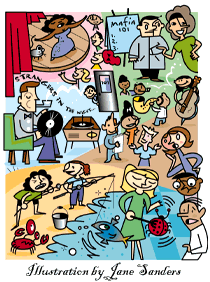
Short, non-credit courses called preceptorials allow students to explore foreign intellectual worlds—and get acquainted with faculty outside the classroom.
By Susan Lonkevich | Illustration by Jane Sanders
When Janelle Brodsky, C/EAS’99, a Penn senior from California, first heard about a program called the undergraduate preceptorials, her initial thought was, “Who the heck is going to sign up for a non-credit class?” Curiosity about the student-organized, faculty-led short courses eventually got the best of her, and in late October the math and systems-engineering major found herself standing waist deep in the bracing waters of the Atlantic Ocean as she learned from Dr. George Thomas, Gr’75, better known as a lecturer in historic preservation and urban studies, how to surf cast. By the time the group headed back from the shore to Thomas’s Philadelphia home to cook up bluefish for dinner, Brodsky hadn’t caught anything. But she had met some new people, seen another part of the East Coast, and discovered that Penn’s faculty have lives, too.
“It was fascinating in its own way,” she says, “because here was this man who was sharing his hobby with us. I originally just assumed that he was some kind of microbiologist or marine-studies professor, but he’s not, and this is just a personal interest of his. Sometimes students forget our professors are people with families and hobbies because they only see them in one isolated setting.”
Preceptorials, which are free short courses offered by faculty and staff on a range of topics, were designed to change that and give students the opportunity to get to know the professor behind the podium as well as promote learning — not for a grade, but for its own sake. Since the program’s creation by the Student Committee on Undergraduate Education (SCUE) three years ago, it has grown from obscurity to popularity, with sessions now in such high demand that the registrar’s office must handle registration. Hundreds of students were turned away from this spring’s 17 offerings. Two of the most popular ones, a preceptorial with Dr. Judith Rodin, CW’66, president of the University, on the current problems of public discourse, and one entitled, “I Want a New Drug,” led by Dr. P. Roy Vagelos, C’50, chair of the Trustees of the University and the former chair of Merck & Co., Inc., required a paragraph statement from students about why they wanted to enroll. Admission to the other preceptorials has been granted at random.
It all began in the spring of 1996. Recalls former SCUE chair Rachael Goldfarb, C’99, who was a freshman at the time, the group had discussed ways in which it could “further the intellectual environment here at Penn. We had considered a number of different approaches,” she says, “but the one which seemed to have the best shot at surviving the institutional traumas of starting a program was this preceptorial idea.”
“The SCUE preceptorials open up for students and faculty whole new areas of intellectual interest, which permit almost any individual in the undergraduate student body to pursue a mentoring relationship with a member of the faculty,” says Mark Frazier Lloyd, director of the University Archives and Records Center, who led a preceptorial last semester entitled “Penn in the 1960s: Why Weren’t We Like Berkeley?” During three gatherings held at Kelly Writers House, Lloyd initially took students further back in time than the 1960s to put the decade into historical context, then led discussions about why Penn’s campus witnessed less social protest than at some other universities. (One possible reason was the conservative influence of the large Wharton School population.)
In the beginning there were just six preceptorials, with 60 seats, and to be guaranteed a spot in one, all a student had to do was sign up. As the word got passed around on campus, however, demand increased. There were some 3,000 requests for the 260 seats available in this spring’s preceptorials, Goldfarb says.”They’ve really become sort of a monster of intellectual engagement.”
Interest has blossomed among the faculty, as well. “In the beginning it was difficult,” Goldfarb recalls, “because first of all, it was hard to articulate what it was that we were trying to achieve: ‘We want you to teach this class, but it’s not really a class, and we don’t really want you to teach, we want you to lead discussions, and nobody’s going to get any credit for it.’ But we got some excited people involved from the beginning, which set a tone of validation for us.” Among them were George Thomas, a frequent preceptorial participant, who gave a walking tour of Philadelphia to highlight the city’s role in the American Revolution, and Dr. Al Filreis, professor of English, who led a course on modern and contemporary American poetry.
“This [past] semester we actually had professors approach us and say they were really interested in doing this. Now that we’ve become really popular,” Goldfarb says, “we’ve had no problems asking professors [to lead preceptorials]. It’s like they’re the anointed ones. We pick people who we think are really extraordinary individuals on this campus.”
“I think SCUE deserves an enormous amount of congratulations,” says Dr. Alan Mann, a professor of anthropology who last fall led a preceptorial with the attention-getting title of, “If We Are What We Eat, Then Why Aren’t Cows Green?” (see box). “This is an incredibly complicated program to develop and to get a lot of my colleagues to do this without compensation is a major thing.”
David Fox, a lecturer in theater arts who also serves as associate director for academic services in the Office of College Houses and Academic Services, taught his first preceptorial, on opera, last semester. “It’s the kind of thing that reinvigorates your interest in teaching,” he observes, “And the money — or the lack of money — is frankly the last thing you think about when you do it.”
The range of past and future preceptorial topics appears to have no limit. Last semester, one history lecturer, Suzanne Tapper, shared her love of jazz with students by taking them out to Philadelphia clubs, while Dr. Peter Conn, The Andrea Mitchell Professor of English, invited writers Buzz Bissinger, C’76, Diane McKinney-Whetstone, CW’75, and Diana Cavallo to discuss their craft. Previous preceptorials have focused on the popularity of best-selling authors like Stephen King, why we feel guilty after eating chocolate, society’s fascination with the physically bizarre via a trip to Philadelphia’s Mütter Museum, and the mysteries of sleep.
The topics are sometimes faculty- inspired, and other times the result of student brainstorming. To give one example, Goldfarb says, “Somebody said they’d really like to learn about the Italian Mafia, so we scoured the campus for a professor whom we thought would be appropriate.” (Dr. Armando Maggi, assistant professor of Romance languages, will be leading the preceptorial this spring). On the other hand, she adds, “You just walk up to Tom Childers and say, ‘What would you like to teach? Because you could lead any [course] and the world would come.'” (Dr. Childers, a professor of history, is leading a preceptorial about Normandy, a timely topic in light of the current popular obsession with World War II.)
SCUE doesn’t want monetary need to prevent students from participating in the preceptorials, so everything required for the courses, from transportation to reading materials to opera tickets, is provided free of charge. SCUE does its part to keep costs down, but Goldfarb would like to see alumni financial support for the program, and for it one day to be endowed.
In many ways the preceptorial idea is an obvious extension of other activities the organization has been involved in since its founding by students as an “independent academic think-tank” in 1965. Over the years SCUE has written numerous position papers in response to academic issues at the University, established a lounge in the Faculty Club where students can take professors out to lunch using their meal plans, and introduced a “speaking across the University” initiative to help students improve their communication and presentation skills. Because the preceptorials are but one program among many that SCUE wants to support, its leaders have decided to train a separate student group to coordinate them and build upon their current success, starting with next semester. The changeover will be gradual, explains Aaron Fidler, W’00, SCUE’s new chair. “Our main concern,” says Goldfarb, “is that this remain institutionalized.”
Institutionalized, but still free in form. What’s key about the preceptorials, after all, is that students help shape the direction of the courses. A preceptorial offered by Dr. Stephen Dunning, professor and chair of religious studies, for instance, was meant to explore the Book of Genesis, but wound up evolving into a free-flowing discussion on religious identity. Dunning says he didn’t have a problem with that turn of events. “They had a genuine interest in learning about each other,” he says. “I sort of thought we would talk mostly about evolution and creation, but this was fine. In many ways it’s of more interest to me than the issues surrounding theories of evolution and creation, which are interesting enough.”
Indeed, the brief and casual nature of the preceptorials presents challenges, as well as opportunities. Fox, for instance, had just two half-day sessions to introduce a group of enthusiastic students to opera — a subject that really can’t be taught in so short a period. “This was for me an intriguing problem to conceptualize: What were the kinds of things they needed to know that would enhance their going to one particular performance and might be a way of organizing their thoughts about any future listening they do?” In the end he was pleased with students’ responses to the preceptorial, which included attending a performance of La Bohème — so pleased that he plans to teach another preceptorial this semester on Frank Sinatra as a cultural icon. Fox also says he was impressed that students took as much time as they did out of their busy study schedules to engage in learning about something that they received no credit for; he likened their enthusiasm to that which he sees in adult continuing-education students.
But there may be a limit to what some students are willing to do in their free time. Mark Lloyd, the University’s archivist, urged students who signed up for his preceptorial on Penn in the 1960s to do their own research between meetings, using primary resources within the archives; he found attendance drop as a result. “Perhaps the Achilles heel of the preceptorial concept is that it’s pitched by SCUE as part-entertainment,” he suggests, “and as soon as the faculty leader explains that he or she will require work from the students, the number of participants immediately falls.”
Participants in preceptorials also lack the luxury of spending an entire semester getting to know each other. Mann, as a senior faculty member, says he finds that it typically takes some time before undergraduates are comfortable enough with him to participate fully in class. Because of this, he thinks he may take a different approach to the next preceptorial he leads, starting out with some snacks and just spending the first hour getting to know the group. “At the end,” he recalls, “when we were having pizza together and chatting, they were asking me about all kinds of things. When undergraduates begin to ask you what you do outside of class, then you know you’ve made an important transition.”




